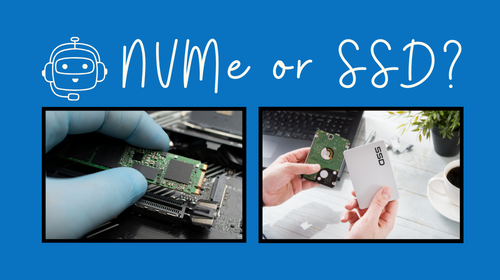NVMe (Non-Volatile Memory Express) and SSD (Solid State Drive) are both types of storage devices that offer significant performance improvements over traditional hard disk drives (HDDs). However, they serve different purposes and have distinct advantages:
1. Speed and Performance:
NVMe drives typically offer faster read and write speeds compared to SSDs, primarily due to their direct connection to the PCIe bus, which reduces latency.
SSDs, while still much faster than HDDs, may have slightly slower performance compared to NVMe drives, especially in tasks involving large file transfers or heavy workloads.
2. Interface and Compatibility:
NVMe drives use the NVMe interface, which is specifically designed for SSDs connected via PCIe (Peripheral Component Interconnect Express). They are compatible with newer systems that support PCIe slots.
SSDs can use various interfaces, including SATA (Serial ATA) and M.2, making them more versatile and compatible with a wider range of devices, including older systems.
3. Price and Capacity:
NVMe drives tend to be more expensive than SSDs, especially for higher-capacity models. They offer faster performance at a premium price point.
SSDs are generally more affordable and available in a wide range of capacities, making them suitable for budget-conscious consumers and systems where raw speed is not the primary concern.
4. Use Cases:
NVMe drives are ideal for high-performance computing tasks, such as gaming, video editing, and data analysis, where speed and responsiveness are critical.
SSDs are suitable for a broader range of applications, including everyday computing tasks, storage expansion, and upgrading older systems to improve performance.
In summary, NVMe drives offer superior speed and performance for demanding workloads but come at a higher cost. SSDs, while slightly slower, provide excellent performance for most applications at a more affordable price point. The choice between NVMe and SSD depends on your specific requirements, budget, and compatibility with your system.

